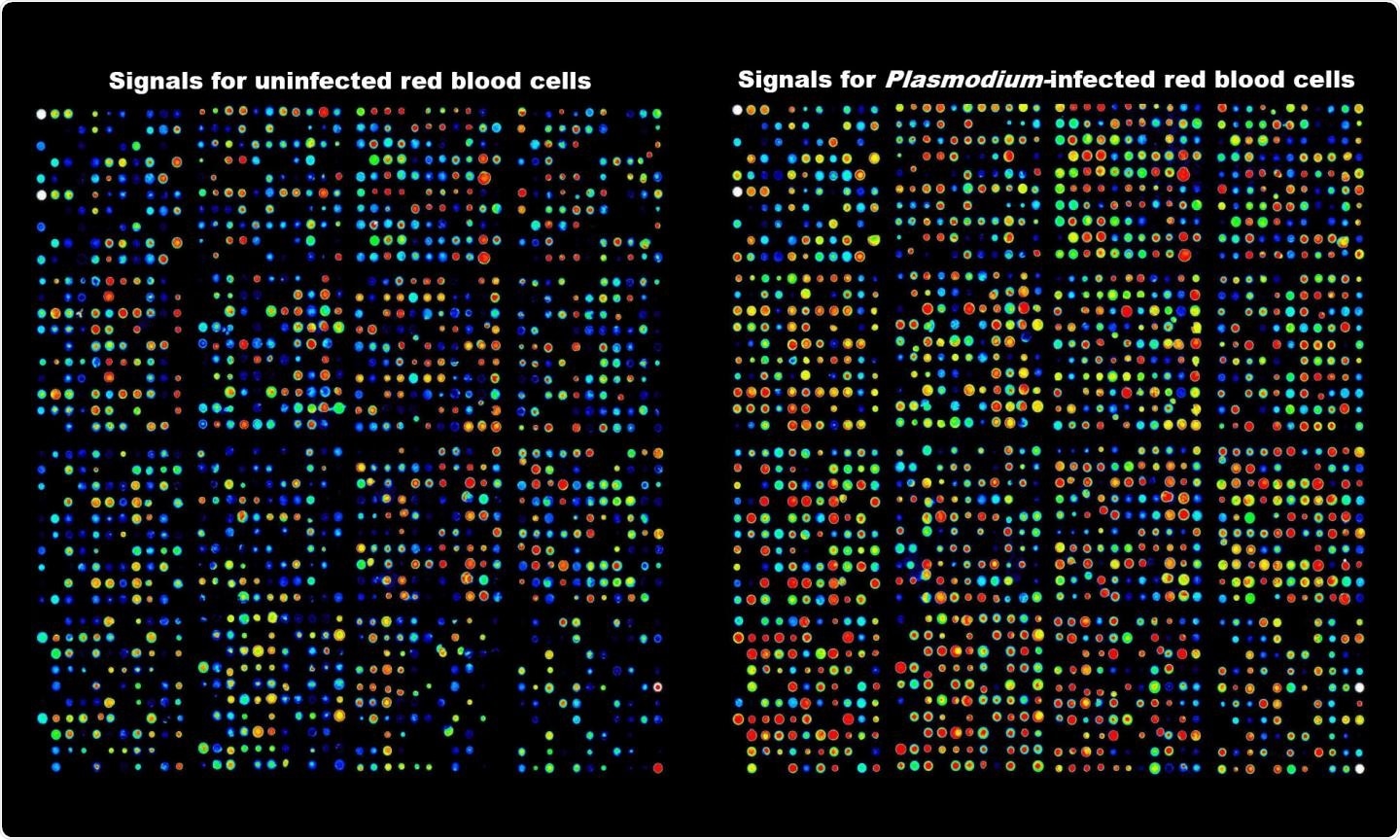Drug discovery for viral diseases has been a difficult task for scientists despite vast technological advancement. Today, the potent severe acute respiratory syndrome coronavirus 2 (SARS-CoV-2) is rippling across the globe, infecting more than 20 million people. Neither a vaccine nor treatment has yet to be discovered, but scientists are looking for drugs used for other diseases in the hopes that they will work in treating SARS-CoV-2 infected patients.
Now, breakthrough research into malaria suggests targeting enzymes from the human host, rather than from the pathogen itself. The new research could pave the way for effective treatments for a wide range of infectious diseases, including the coronavirus disease (COVID-19).

Antibody array data showing activation of kinases in human red blood cells infected with the malaria parasite. CREDIT RMIT University
The study
The team, which was led by RMIT University's Professor Christian Doerig, underlines a new technique that could save years of drug discovery research and a hefty amount of money in drug development. The approach aims to repurpose existing treatments designed for other conditions, including cancer.
In the study, published in the journal Nature Communications, the team has shown that the parasites that cause malaria, Plasmodium falciparum, are very dependent on enzymes in the red blood cells where the parasite evades the immune system and proliferate.
"Evidence is emerging that signal transduction elements are activated in a-nucleated erythrocytes in response to infection with malaria parasites, but the extent of this phenomenon remains unknown. Here, we fill this knowledge gap through a comprehensive and dynamic assessment of host erythrocyte signaling during infection with Plasmodium falciparum," the researchers explained.
Targeting the pathogen
Since there are drugs developed for cancer, which inactivate these human enzymes called protein kinases, they may efficiently kill the parasite. This method could be an alternative to treatments that target the parasite itself, rather than focusing on the enzymes.
The researchers said that the analysis has shown which of the host cell enzymes were activated in the advent of an infection, unveiling new points of reliance of the parasite on the human host. The method could pave the way to reduce the cost and hasten the development and distribution of new antimalarial drugs.
Today, some patients infected with the severe acute respiratory syndrome coronavirus 2 (SARS-CoV-2), the virus that causes COVID-19 disease, are being given antimalarials as scientists hope these drugs could help prevent the progression of severe illness.
"These host enzymes are in many instances the same as those activated in cancer cells, so we can now jump on the back of existing cancer drug discovery and look to repurpose a drug that is already available or close to completion of the drug development process," Dr. Jack Adderley explained.
Drug repurposing
Aside from enabling the repurposing of drugs, which can reduce the time needed for drugs to be approved, the novel approach is more likely to reduce drug resistance, as the pathogen cannot evade by mutating the target of the drug, just like what is happening in other antimalarials.
One of the lead authors, Professor Doerig, suggests that the findings bring hope to the team that the new method could reduce drug resistance, which is one of the biggest challenges in the world of healthcare. This is not just applicable to malaria but to all diseases caused by infectious agents.
"We are at risk of returning to the pre-antibiotic era if we don't solve this resistance problem, which constitutes a clear and present danger for global public health. We need innovative ways to address this issue," Doerig said.
"By targeting the host and not the pathogen itself, we remove the possibility for the pathogen to rapidly become resistant by mutating the target of the drug, as the target is made by the human host, not the pathogen," he added.
The team now plans to work with the Peter Doherty Institute for Infection and Immunity to study potential COVID-19 treatments further using the approach. The study brings hope that drugs can be developed to fight diseases that were tagged incurable in the past.
Journal reference:
- Adderley, J., von Freyend, S., Jackson, S., Bird, M., Doerig, C., et al. (2020). Analysis of erythrocyte signalling pathways during Plasmodium falciparum infection identifies targets for host-directed antimalarial intervention. Nature Communications. https://www.nature.com/articles/s41467-020-17829-7